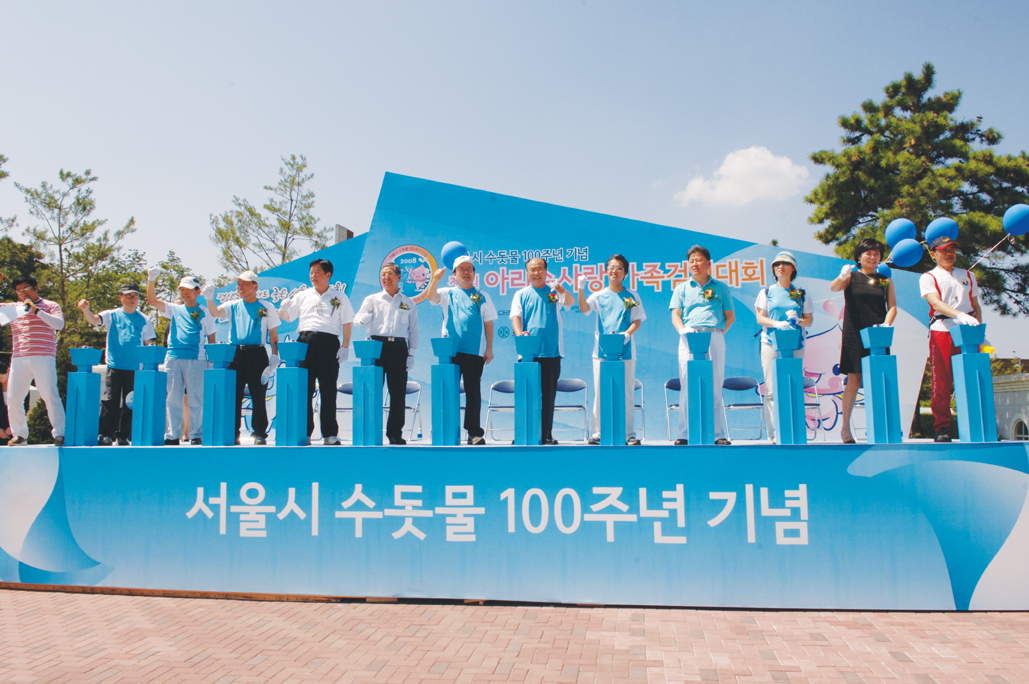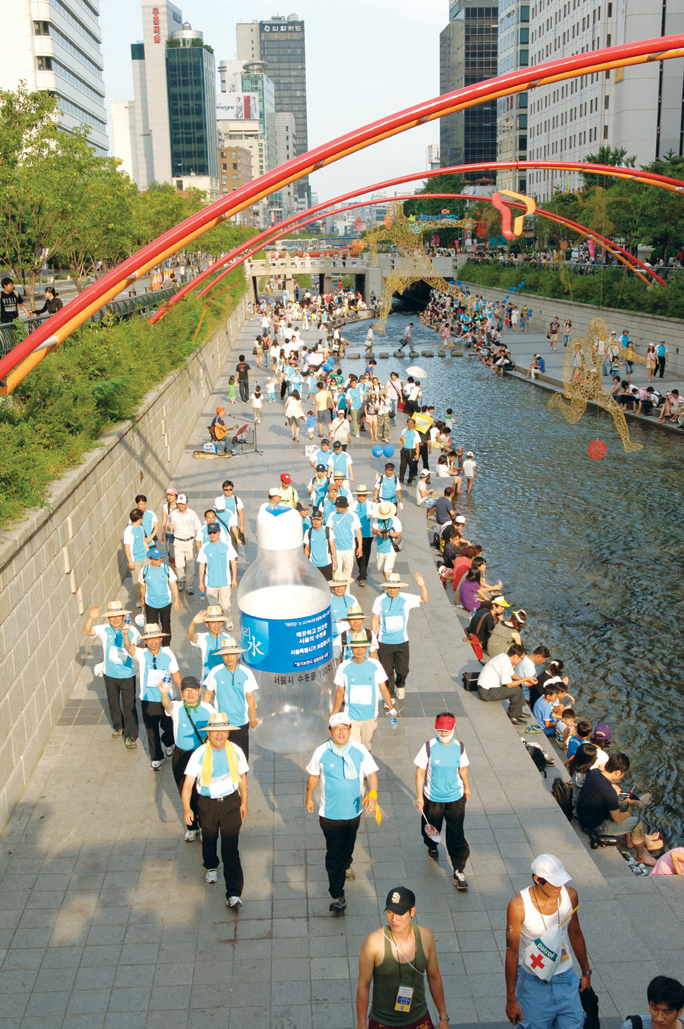Seoul City Water 'Arisu'Turns 100
A festival is held to celebrate the centennial of Seoul's first supply of tap water; a look into its past, present and future
 Approximately 5,000 Seoulites, including Seoul Mayor Oh Se-hoon, gathered at the Seoul Plaza in front of City Hall on Aug. 30 to attend a ceremony to celebrate the centennial of Seoul's first supply of tap water.
Approximately 5,000 Seoulites, including Seoul Mayor Oh Se-hoon, gathered at the Seoul Plaza in front of City Hall on Aug. 30 to attend a ceremony to celebrate the centennial of Seoul's first supply of tap water.
Mayor Oh said in his speech, "Seoulites spend about 300 billion won per year to use purifiers. We promise to do our best to make piped water quality high enough so that the cost from the mistrust over it can be cut as soon as possible."
Oh delivered a thank-you document to those who have made meritorious contributions to the development of the metropolitan city's tap water industry. Bohae Brewery Chairman & CEO Lim Kun-woo was cited for donating to the Seoul Metropolitan Government the trademark right to Seoul city water's brand 'Arisu,'which his company has held since 1995.
The highlight of the opening ceremony was a mime performance titled 'Arisu Vision Performance.'The centennial festival, which lasted into the evening of Aug.
 31, featured a variety of events. They included a performance by superstar singers, including Seo In-yeoung, Kim Gun-mo, Jang Yoon-jung, Baby Box and Cool. Seoulites participated in the first Arisu Love Family Walkathon on the afternoon of Aug. 30 along Cheonggyecheon Stream. The walkathon was divided into a 13.5 km-long full-course that started from the Piped Water Museum and ended at the Seoul Plaza via Cheonggyecheon Stream, an 8.2 km-long course and a 5.5 km-long course.
31, featured a variety of events. They included a performance by superstar singers, including Seo In-yeoung, Kim Gun-mo, Jang Yoon-jung, Baby Box and Cool. Seoulites participated in the first Arisu Love Family Walkathon on the afternoon of Aug. 30 along Cheonggyecheon Stream. The walkathon was divided into a 13.5 km-long full-course that started from the Piped Water Museum and ended at the Seoul Plaza via Cheonggyecheon Stream, an 8.2 km-long course and a 5.5 km-long course.
Japanese tourists were among those who participated in an event of reenacting water sellers hailing from Bukcheong, who carried Arisu in wooden buckets the way ancient Koreans did.
A publicity pavilion designed to celebrate the centennial of Seoul's supply of piped water is open to the general public. Visitors to the pavilion can take a look into the past, present and future of Arisu. They are given the chance to get the correct information and a better understanding of the city water Seoulites drink every day, including how it is treated.
 he Office of Waterworks at the Seoul Metropolitan Government (SMG) held a ceremony to mark the publication of a book on the centennial of Seoul's supply of tap water at the Seoul Plaza Hotel on Sept. 1 with many celebrities including Second Seoul Vice Mayor Choi Chang-shik participating. A total of 1,000 copies of the book were distributed to major libraries and related organizations across the nation. The publication of the book was designed not only to write and preserve the facts about the 100-year history of the tap water behind the development of Seoul and the promotion of Seoulites'health, but also to suggest the future direction and vision of Arisu by reviewing its achievements and increase the number of Arisu drinkers by promoting its safety, Seoul City officials said.
he Office of Waterworks at the Seoul Metropolitan Government (SMG) held a ceremony to mark the publication of a book on the centennial of Seoul's supply of tap water at the Seoul Plaza Hotel on Sept. 1 with many celebrities including Second Seoul Vice Mayor Choi Chang-shik participating. A total of 1,000 copies of the book were distributed to major libraries and related organizations across the nation. The publication of the book was designed not only to write and preserve the facts about the 100-year history of the tap water behind the development of Seoul and the promotion of Seoulites'health, but also to suggest the future direction and vision of Arisu by reviewing its achievements and increase the number of Arisu drinkers by promoting its safety, Seoul City officials said.
In celebration of the 100th anniversary of Arisu, the Office of Waterworks organized the three-day Seoul International Symposium on Water Policy & Waterworks Technology 2008 at the Korea Chamber of Commerce & Industry from Sept. 1-3.
 Eighteen foreign authorities from eight countries, including the United States, as well as 12 Korean experts made presentations during the seminar, which covered the water polices of major countries, water management policies of major cities, management of water quality and trends in waterworks technology.
Eighteen foreign authorities from eight countries, including the United States, as well as 12 Korean experts made presentations during the seminar, which covered the water polices of major countries, water management policies of major cities, management of water quality and trends in waterworks technology.
Seoul Mayor Oh said in his welcoming message, "The global water market, which is growing ever more rapidly, is expected to reach the size of the oil market in 10 years. The 21st century is often referred to as of the century of water, thus a stable supply of clean water has become an emerging national priority for many countries around the world."Seoul city water dates back to Sept. 1, 1908 when tap water was supplied to downtown Seoul and part of the Yongsan area by a water purification facility, which is now the Ttukseom Purification Center. At that time, the facility, with a daily capacity of 12,500 cubic meters, supplied water to 125,000 residents. As of 2007, Seoul has six purification plants with
 a combined daily capacity of 3.34 million cubic meters, said Jin Ik-chull, vice mayor of the Waterworks Office.
a combined daily capacity of 3.34 million cubic meters, said Jin Ik-chull, vice mayor of the Waterworks Office.
The brand 'Arisu'was named after the old name of the Han River at the time of Goguryeo, an ancient Korean Kingdom. Arisu means "a great river"or "water"in view of the historical linguistics of Korean.
Arisu has already become a familiar fixture as the drinking water at government ministries and other offices as well as conferences sponsored by the SMG.
Noteworthy is the fact that the metropolitan government's bottled Arisu was provided at the first Cabinet meeting of the Lee Myung-bak government on March 3 to the president and his Cabinet. To this end, one day earlier, the Office of Waterworks at the SMG supplied 38 boxes of 350 ml bottled Arisu to Cheong Wa Dae.
Arisu has been supplied to the participants of conferences organized by about 70 government agencies, including the Prime Minister's Office, the Ministry of Justice, the Ministry of Foreign Affairs and Trade, the Ministry of Labor, the Ministry of Knowledge Economy and the Ministry of Health, Welfare and Family Affairs as well as the participants of the Cabinet ministers and vice ministers'meetings and international conferences since one year ago.
As early as October 2005, the Seoul Metropolitan Government, headed by then-Mayor Lee Myung-bak, began to supply Arisu to its offices and subsidiary institutions. Current Seoul Mayor Oh and his family have been supplied with the metropolitan government's tap water since his inauguration.
In 2001, Arisu made its debut in the form of bottled water in order to provide citizens with an opportunity to sample tap water and use it in emergency situations. Tens of thousands of Seoulites who poured into the streets to cheer for the Korean national soccer team during the 2006 World Cup were supplied with bottled Arisu free of charge to help ease their thirst. The Waterworks Office also offered about 30,000 bottles of Arisu to a flood of volunteers cleaning up the oil spill caused by the supertanker Hebei Spirit off the Taean Peninsula late last year and donated 50,000 1.8-liter bottles of Arisu to North Korean flood victims in September last year.
In the latest development, Seoul Mayor Oh donated 100,000 bottles of Arisu to the Chinese People's Association for Friendship with Foreign Countries on Aug. 9 in Beijing, asking that the water to be supplied to the volunteers of the 2008 Beijing Olympics and a South Korea cheering squad there. Oh delivered the bottled water to the Chinese side during his stay in Beijing to attend the Olympic opening ceremony. This was the second time that the Seoul Metropolitan Government offered Arisu to the Chinese since this past June when 100,000 bottles were sent to the quake-hit Sichuan Province.
In a bid to root out the lingering misgivings over the safety of Arisu, the metropolitan government conducts free checks of households who want to find out whether their tap water is safe. It is subsidizing the expenses for replacing worn-out and rusty indoor pipelines in an effort to ensure the supply of quality Arisu.
The municipal government plans to introduce an advanced purification system that will again treat with granular activated carbon the water initially treated with the existing purification facilities. The upgrade will begin with the Yeongdeungpo Water Purification Plant in 2010 and all plants will be upgraded by 2013. nw
Celebrities, including Seoul Mayor Oh Se-hoon, attend a ceremony to celebrate the centennial of Seoul's first supply of tap water at the Seoul Plaza on Aug. 30.
Jin Ik-chull, vice mayor of the Office of Waterworks at the Seoul Metropolitan Government
(photo left) Seoul Mayor Oh Se-hoon and other SMG officials say a good-bye to a truck delivering 100,000 tons of Arisu, to be donated to Chin,; a ceremony to launch a walkathon marking the centennial of Seoul's supply of tap water.; and many Seoulites participate in the walkathon.
3Fl, 292-47, Shindang 6-dong, Chung-gu, Seoul, Korea 100-456
Tel : 82-2-2235-6114 / Fax : 82-2-2235-0799